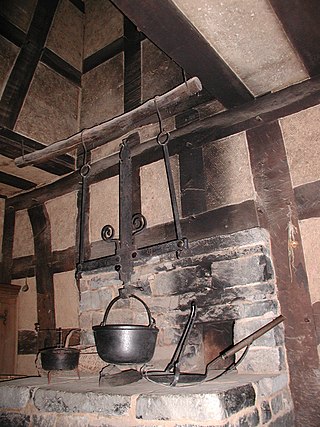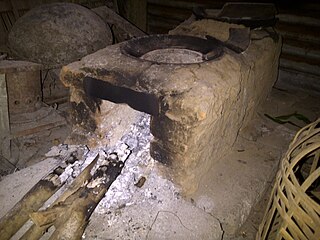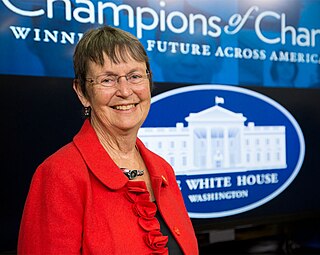
A kitchen is a room or part of a room used for cooking and food preparation in a dwelling or in a commercial establishment. A modern middle-class residential kitchen is typically equipped with a stove, a sink with hot and cold running water, a refrigerator, and worktops and kitchen cabinets arranged according to a modular design. Many households have a microwave oven, a dishwasher, and other electric appliances. The main functions of a kitchen are to store, prepare and cook food. The room or area may also be used for dining, entertaining and laundry. The design and construction of kitchens is a huge market all over the world.

A hearth is the place in a home where a fire is or was traditionally kept for home heating and for cooking, usually constituted by a horizontal hearthstone and often enclosed to varying degrees by any combination of reredos, fireplace, oven, smoke hood, or chimney. Hearths are usually composed of masonry such as brick or stone. For millennia, the hearth was such an integral part of a home, usually its central and most important feature, that the concept has been generalized to refer to a homeplace or household, as in the terms "hearth and home" and "keep the home fires burning". In the modern era, since the advent of central heating, hearths are usually less central to most people's daily life because the heating of the home is instead done by a furnace or a heating stove, and cooking is instead done with a kitchen stove/range alongside other home appliances; thus many homes built in the 20th and 21st centuries do not have hearths. Nonetheless, many homes still have hearths, which still help serve the purposes of warmth, cooking, and comfort.

A portable stove is a cooking stove specially designed to be portable and lightweight, used in camping, picnicking, backpacking, or other use in remote locations where an easily transportable means of cooking or heating is needed. Portable stoves can be used in diverse situations, such as for outdoor food service and catering and in field hospitals.

A stove or range is a device that generates heat inside or on top of the device, for -local heating or cooking. Stoves can be powered with many fuels, such as natural gas, electricity, gasoline, wood, and coal.

A kitchen stove, often called simply a stove or a cooker, is a kitchen appliance designed for the purpose of cooking food. Kitchen stoves rely on the application of direct heat for the cooking process and may also contain an oven, used for baking. "Cookstoves" are heated by burning wood or charcoal; "gas stoves" are heated by gas; and "electric stoves" by electricity. A stove with a built-in cooktop is also called a range.
The Japanese kitchen is the place where food is prepared in a Japanese house. Until the Meiji era, a kitchen was also called kamado and there are many sayings in the Japanese language that involve kamado as it was considered the symbol of a house. The term could even be used to mean "family" or "household". Separating a family was called kamado wo wakeru, or "divide the stove". Kamado wo yaburu means that the family was broken.

A solar cooker is a device which uses the energy of direct sunlight to heat, cook or pasteurize drink and other food materials. Many solar cookers currently in use are relatively inexpensive, low-tech devices, although some are as powerful or as expensive as traditional stoves, and advanced, large scale solar cookers can cook for hundreds of people. Because they use no fuel and cost nothing to operate, many nonprofit organizations are promoting their use worldwide in order to help reduce fuel costs and air pollution, and to help slow down deforestation and desertification.

Harris Lee Whitbeck Cain is a Guatemalan journalist, author, and television personality currently serving as the director of the Guatemalan Institute of Tourism (INGUAT) for the Bernardo Arévalo administration. Prior to becoming the director of INGUAT, Whitbeck worked as a correspondent and Latin America bureau chief for CNN.

Household air pollution (HAP) is a significant form of indoor air pollution mostly relating to cooking and heating methods used in developing countries. Since much of the cooking is carried out with biomass fuel, in the form of wood, charcoal, dung, and crop residue, in indoor environments that lack proper ventilation, millions of people, primarily women and children face serious health risks. In total, about three billion people in developing countries are affected by this problem. The World Health Organization (WHO) estimates that cooking-related pollution causes 3.8 million annual deaths. The Global Burden of Disease study estimated the number of deaths in 2017 at 1.6 million. The problem is closely related to energy poverty and cooking.

Solar Cookers International (SCI) is a 501(c)(3) nonprofit, non-governmental organization that works to improve human and environmental health by supporting the expansion of effective carbon-free solar cooking in world regions of greatest need. SCI leads through advocacy, research, and strengthening the capacity of the global solar cooking movement. SCI has consultative status with the United Nations Economic and Social Council (ECOSOC) and was founded in 1987.

A wood-burning stove is a heating or cooking appliance capable of burning wood fuel, often called solid fuel, and wood-derived biomass fuel, such as sawdust bricks. Generally the appliance consists of a solid metal closed firebox, often lined by fire brick, and one or more air controls. The first wood-burning stove was patented in Strasbourg in 1557. This was two centuries before the Industrial Revolution, so iron was still prohibitively expensive. The first wood-burning stoves were high-end consumer items and only gradually became used widely.
Aprovecho is the name of two non-profit organizations located in Cottage Grove, Oregon. Aprovecho Sustainability Education Center is a not-for-profit organization based in the vicinity of Cottage Grove, Oregon. Its focus is on sustainable living, including permaculture and renewable energy. Its sister organization, Aprovecho Research Center, develops efficient cook stoves for use in developing countries.
Open Windows Foundation is a US-registered 501(c)(3) non-profit organization focusing on youth education and programming in San Miguel Dueñas, Guatemala. The center was founded in 2001 by Ericka Kaplan, Jean Uelmen, and Teresa Quiñonez and now serves over 1,000 members of the Dueñas community.

Project Gaia is a U.S.-based non-governmental, non-profit organization engaged in developing alcohol-based fuel markets for household use in Ethiopia and other developing countries. The organization identifies alcohol fuels as a potential alternative to traditional cooking methods, which they suggest may contribute to fuel shortages, environmental issues, and public health concerns in these regions. Focusing on impoverished and marginalized communities, Project Gaia is active in Ethiopia, Nigeria, Brazil, Haiti, and Madagascar. The organization is also planning to expand its projects to additional countries.
The Clean Cooking Alliance, formerly the Global Alliance for Clean Cookstoves, is a non-profit organization operating with the support of the United Nations Foundation to promote clean cooking technologies in lower and middle-income countries. Four million people a year die from health problems attributable to household air pollution from the use of polluting open fires and inefficient fuels for cooking. The Alliance was announced in 2010 by then-U.S. Secretary of State Hillary Rodham Clinton. Dymphna previously worked as CEO for the Clinton Climate Initiative organization.

BioLite is a New York City-based startup company that produces off-grid energy products for outdoor recreational use and emerging markets. The company is known for its wood-burning stoves that use thermoelectric technology to create usable electricity from the heat of their fires. It was founded in 2006.
EcoZoom is a certified B Corporation that makes charcoal, wood and biomass cook stoves. The company has offices in Portland, Oregon and Nairobi, Kenya. EcoZoom holds the exclusive license to distribute stove technology designed by Aprovecho in developing countries and a second license to distribute in the United States.
InStove (Institutional Stove Solutions) is a 501(c)(3) nonprofit organization established in 2012.

Nancy Sanford Hughes is the founder and president of the non-profit StoveTeam International. For her work bringing improved cookstoves to Latin America, Hughes has been honored as a United States White House Champion of Change, and a CNN Hero.

One aspect of energy poverty is lack of access to clean, modern fuels and technologies for cooking. As of 2020, more than 2.6 billion people in developing countries routinely cook with fuels such as wood, animal dung, coal, or kerosene. Burning these types of fuels in open fires or traditional stoves causes harmful household air pollution, resulting in an estimated 3.8 million deaths annually according to the World Health Organization (WHO), and contributes to various health, socio-economic, and environmental problems.













